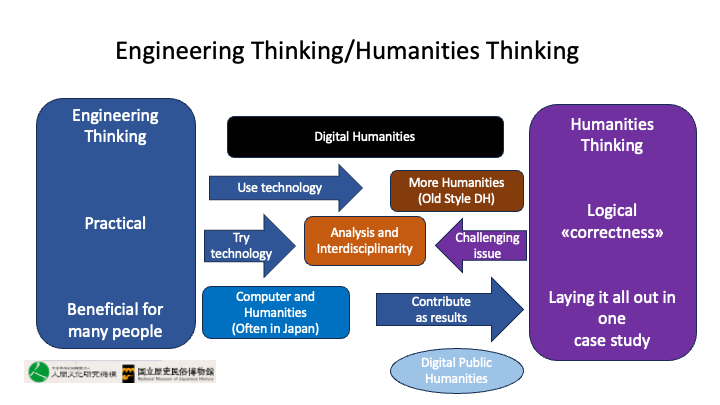Adapting to Changing Trends in Japanese Studies
日本研究の時流に適応する
Report from the Panel Discussion of the 2023 Annual Conference of the European Association of Japanese Resource Specialists.
EAJRS (the European Association of Japanese Resource Specialists) is a European network for Japanese-related resources. The network holds an annual conference where librarians, curators, and researchers participate. “Adapting to Changing Trends in Japanese Studies” was the theme of this year’s conference, and one panel focused on Digital Humanities (DH) in Japan and Japanese studies.
The purpose of this panel was not to arrive at a conclusion but to find out what the gap in understanding of DH in Japan and Japanese studies is and to find ways to improve communication between different groups. This is a summary of the discussion.
Engineering Thinking vs Humanities Thinking
This illustration below by Makoto Goto shows different ways of thinking about DH among engineering/information scientists and humanists in Japan. This may be transferred to the situation between engineering scientists and humanists generally.

Engineering/information scientists tend to emphasize practical perspectives and contend that if something works well, its merit is established. At the same time, humanists are more inclined to assert that logically correct elements are obligatory. Consequently, the application of DH methods necessitates the need to be aware of this divergence in thinking. This is the information we should remember when we talk about DH and humanities.
The Role of the Library
Whether the library, which is also the provider of materials and resources, should support DH initiatives provided different views. While some argued that libraries should play a pivotal role in interconnecting different academic fields, others posited that such intervention was uncalled for.
From an educational perspective, the discussion underscored the importance of the library's role in teaching information literacy skills, as the faculties do not always teach this.
Research data management (RDM) and DH are intertwined in Japan, but initially, RDM was not in the informatics field. Several humanists have produced Big Data in Japan, and they did RDM as well. Big Data and RDM cannot be separated from work in Japan.
We also observe different needs for DH information among humanists, depending on their age. Regardless of all the differences, including intergenerational disparities and scarcity of materials, the panellists agreed that a collaborative framework is an essential challenge which libraries should play an essential role in mediating.
Owing to the lack of a clear-cut definition of DH, the pivotal importance of methodology and mindset came to the fore. Collaboration between different experts is natural since DH is cross-disciplinary, and various ways of approaches are needed. Therefore, libraries are mandated to mediate and offer support for DH. The panellists and audience agreed on this part.
Digital Humanities and Japanese Studies
There have been several DH-related activities in Japanese studies in the last few years. “The Value in Numbers: Reading Japanese Literature in a Global Information Age” by Hoyt Long (2021) gathered attention inside and outside of Japanese studies. His quantitative research used Aozora bunko, which started in 1997, to digitalize Japanese literature. Other Big data are offered by several institutions decade in Japan, such as NDL Digital Collections from the National Diet Library, Khrin by the National Museum of Japanese History, and Minna de honkoku (Read historical materials with open collaboration). Paula R. Curtis offers Digital Resources and Projects in East Asia. She is also responsible for the Japanese part of East Asian Studies and Digital Humanities offered by Prince Lab for DH and Penn Libraries. Nobutake Kamiya gives an overview of Japanese databases as a platform for collaboration to collect a database list related to Japanese studies. The national cross-search portal Japan Search started in August 2020. There are many possibilities for more DH activities which should be tried.



.png?alt=listing)

